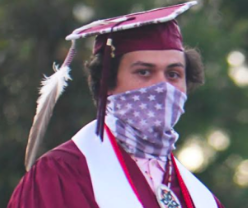Guest Opinion. Education has always been sacred to the Cherokee people. Investing in education was one of the first and highest priorities for Cherokee Nation after the Trail of Tears. Despite the extreme hardships of that time, we quickly established schools in our new land. Within a few years, we had built the first primary schools and institutes of higher education on our reservation.

Our strong commitment to education continues today. Each year, we make substantial donations to school districts in and near our reservation, including a record $7.8 million this year, from tribal car tag revenue. We provide thousands of scholarships to Cherokee students pursuing higher education, and we invest millions in other forms of education like Career Tech and job training.
We do this because, like many Native American nations and people, educating our children is one of our highest values. When Native students complete an educational milestone, like graduating from high school or college, their families often want to celebrate and honor that achievement with a special symbol.
Every year American Indian high school students across Oklahoma, including many Cherokees, are gifted traditional regalia to be worn at graduation ceremonies. Tribal regalia, including items like eagle feathers, jewelry, beaded caps, stoles, moccasins or other symbols, are protected expressions of our cultural and religious beliefs.
For example, an eagle feather symbolizes trust, honor, strength, wisdom, power and freedom. It is a deeply revered object, especially when gifted to mark a significant personal achievement. This can be for leadership or academic accomplishment, as a sign of maturity, and to signify an important educational journey.
These traditions are safeguarded under the Oklahoma Religious Freedom Act. Most schools understand and respect the cultural and legal rights of Native students. Unfortunately, we still see incidents of schools in Oklahoma refusing to allow them.
Cherokee Nation firmly stands behind the rights of Native American students to wear tribal regalia and items of religious or cultural significance during graduation ceremonies. Public schools in Oklahoma must create a safe and inclusive environment where Native American students can freely express their cultural identity without fear of discrimination or punishment. We are proud of our youth, and Cherokees must have the spiritual freedom to show who they are at this important point in their lives.
Cherokee Nation is committed to vigorously defending the rights of Cherokee students, and we call upon all public schools in Oklahoma to clearly state that tribal regalia is allowed for Native American students during graduation ceremonies.

In this, we stand united with other tribes in Oklahoma. The Inter-Tribal Council, representing the Cherokee, Chickasaw, Choctaw, Muscogee and Seminole Nations, passed a resolution calling on public school districts to protect students’ right to wear regalia or other culturally significant items during graduation ceremonies.
Receiving an eagle feather or other tribal regalia for a graduation ceremony can be as significant as earning the diploma itself. These practices honor the graduate and their family, community and tribe. We appreciate the work by our public school districts to ensure that these events are conducted in a safe and respectful manner.
Chuck Hoskin, Jr. is the principal chief of the Cherokee Nation.
More Stories Like This
Friday the 13th: When Superstition Proves More Powerful Than LawCongress Must Impose Guardrails on Out-of-Control ICE
Housing and Support Services: The Key to Restoring Justice
TCUs’ Unique Take on the Purpose of Education: A Reflection for National Tribal Colleges and Universities Week
When Journalism Is Treated as a Crime, Democracy Is in Danger
Help us defend tribal sovereignty.
At Native News Online, our mission is rooted in telling the stories that strengthen sovereignty and uplift Indigenous voices — not just at year’s end, but every single day.
Because of your generosity last year, we were able to keep our reporters on the ground in tribal communities, at national gatherings and in the halls of Congress — covering the issues that matter most to Indian Country: sovereignty, culture, education, health and economic opportunity.
That support sustained us through a tough year in 2025. Now, as we look to the year ahead, we need your help right now to ensure warrior journalism remains strong — reporting that defends tribal sovereignty, amplifies Native truth, and holds power accountable.
 The stakes couldn't be higher. Your support keeps Native voices heard, Native stories told and Native sovereignty defended.
The stakes couldn't be higher. Your support keeps Native voices heard, Native stories told and Native sovereignty defended.
Stand with Warrior Journalism today.
Levi Rickert (Potawatomi), Editor & Publisher

